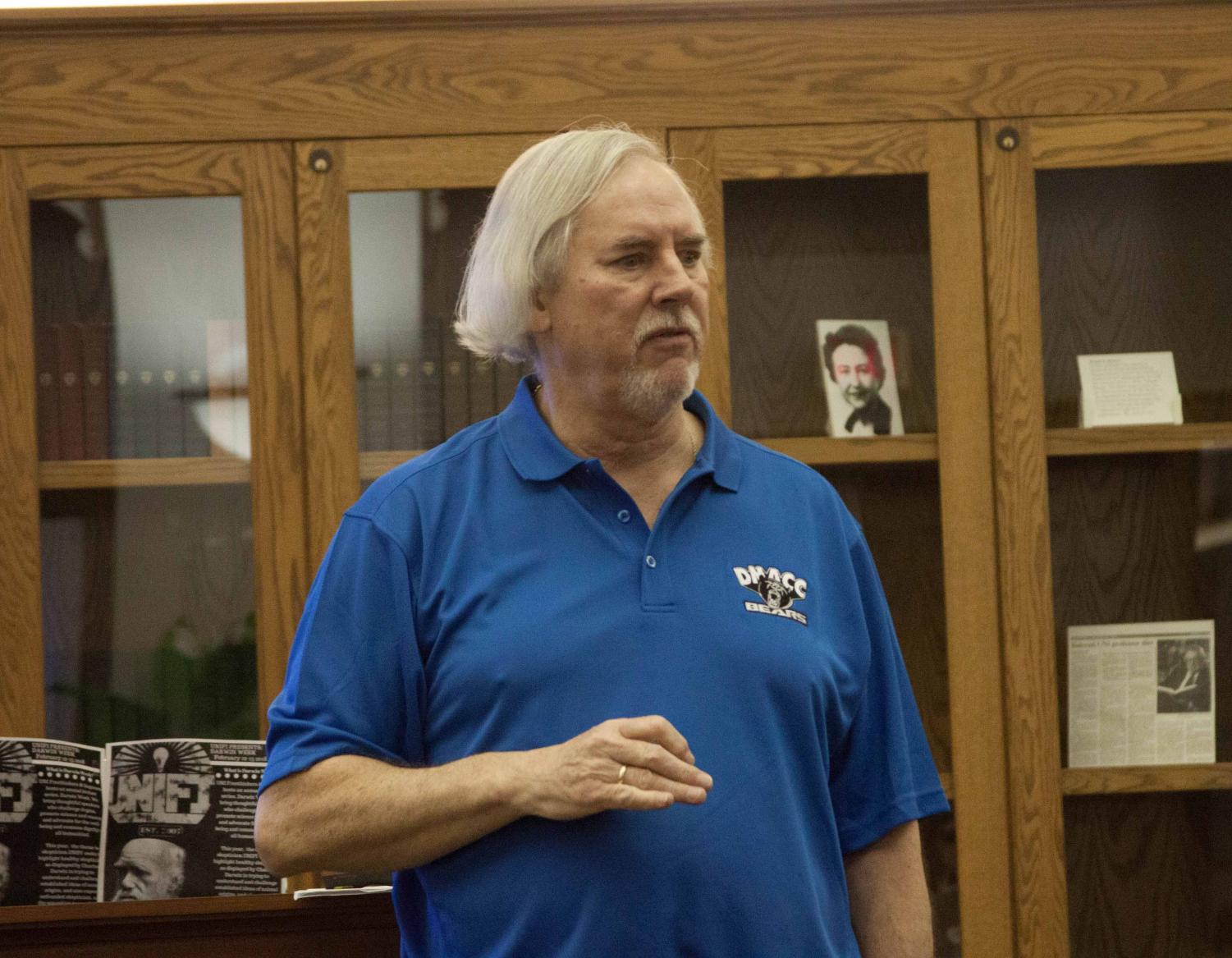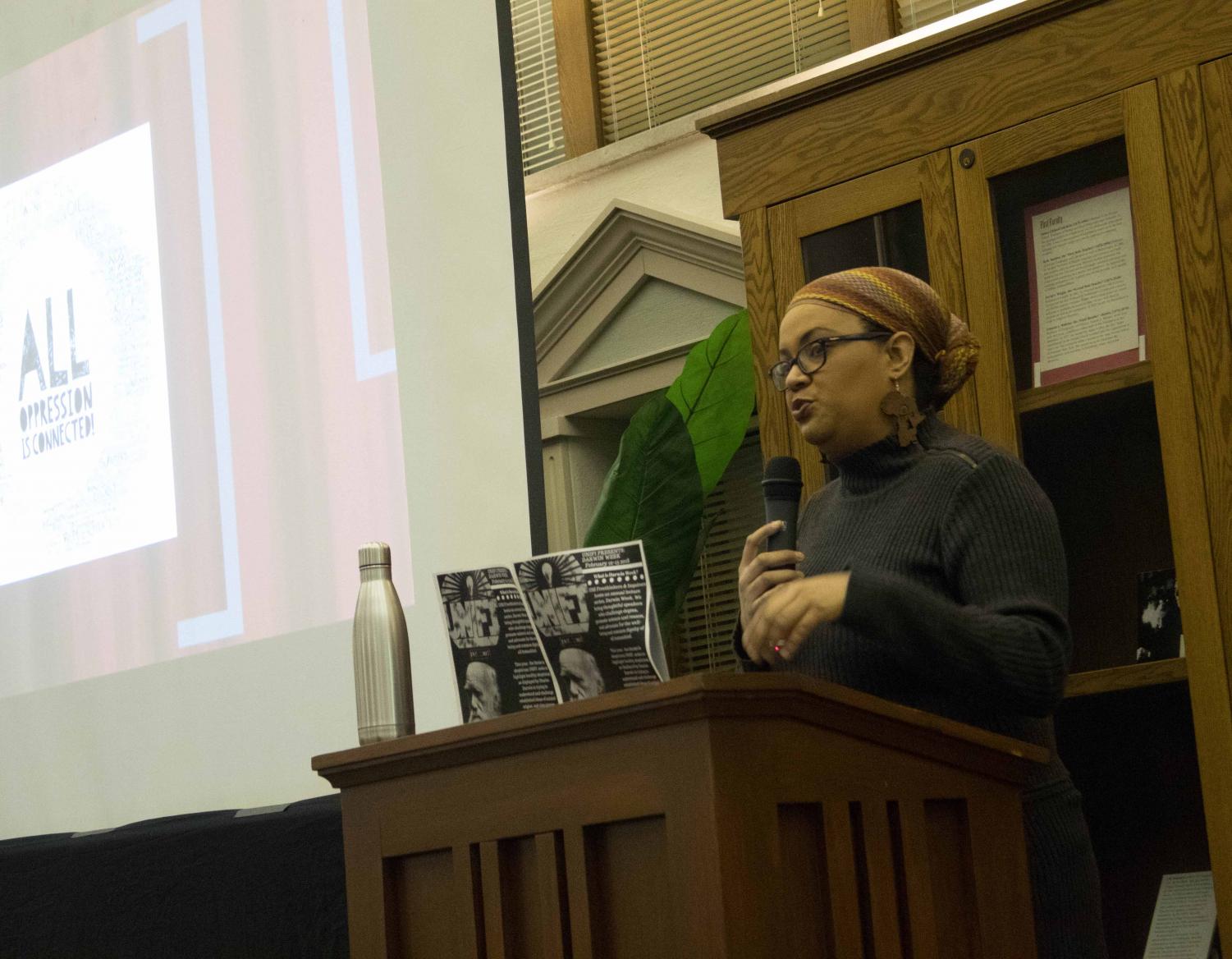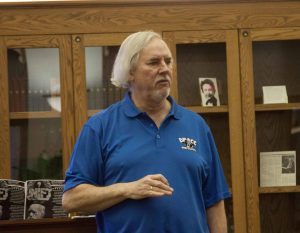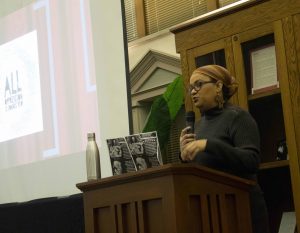Darwin Week 2018
Feb 19, 2018
“Science is not a democracy. It is a dictatorship. It is evidence that does the dictating,” wrote John Reisman, author of Exposing the Climate Hoax.
This week, UNI Freethinkers and Inquirers gave science a week-long spotlight, entreating students to listen to the evidence and be skeptical of the world around them.
Darwin Week featured a wide array of lecturers and topics. Tuesday’s lecture by Dr. Lisa Millsaps, assistant professor of geography education and social science education, centered around skepticism, uncertainty and vulnerability in geography. Millsaps explained that maps are a tool to simplify complex patterns. They offer enhanced insight and context, but they are limited by distortions of shape, area, distance and data manipulation. Regardless, Millsaps discussed Americans’ limited knowledge about maps.
“It simply does not occur to the ordinary American intellectual that a map is more than a thing that describes location,” Millsaps said. “A good map raises more questions than it answers. We are taught the textbook is God. It’s great when we learn new things. It should be celebrated.”
Millsaps further explained that maps can exaggerate data or even lie, and students need to realize how to properly evaluate what a map is telling them. Millsaps sees this knowledge as essential, yet unknown to many.
“Americans are taught from an early age to analyze and understand the meaning and manipulation of words, but they are rarely taught the same skills about maps,” Millsaps said.
Millsaps ended her lecture with a few tips for students to consider when they evaluate a map. Students should use the map’s title as a resource and guide to thinking about the data, check the source, and think about what idea is being pushed.
Tuesday’s keynote lecturer, Diane Burkholder, spoke to students about intersectionality within the freethought movement, including how there is not enough action. Burkholder discussed how hatred is thriving, even here in the Cedar Valley, as this area was rated as the 10th worst city in the U.S. for African Americans by 24/7 Wall Street and the Huffington Post.
Burkholder’s key message was compelling for students: All oppression is connected, and we do not live single-issue lives.
Burkholder discussed the term intersectionality, which is not a term synonymous with identity, but rather describes how structures make certain identities vulnerable. It is not about counting how many identities people have, but Burkholder warned that the student affairs profession uses the term this way. Burkholder described this as the term being co-opted and watered down, saying “intersectionality is being colonized by white people.” She urged students to use words in their applied contexts.
Burkholder’s lecture provided insight to the flaws in society’s discussion of racism and other discrimination. She explained that racism is referred to as a binary, with racist individuals being “bad, ignorant, southern and old” while not racist individuals are “good, educated, progressive, young and northern.” This is not the issue to be discussing, according to Burkholder.
“All white people are racist, men are sexist and straight people are homophobic. The question is not whether or not you are racist, the question is if you are anti-racist — what do you do to actively be an ally?”
Burkholder’s critique on the ally community did not stop here, as she argued that everyone is racist, but it is often the “I want to eat crunchy food and do yoga racism” and not “confederate flag Cheeto president racism.”
“It’s the tolerance or defense of their presence of people who claim to be on the side of justice and equality,” Burkholder said.
Burkholder connected this issue to the “us versus them” mentality allies tend to take on. She explained that, in the atheist community, she witnesses people focusing on exposing how wrong “they” are, because it is “satisfying and comforting,” but we are them, and examining oneself is important. She added that everyone needs to give criticism a fair hearing. After apologizing, allies need to “pick themselves up and get back to work,” according to Burkholder.
“Privilege is getting to walk away,” Burkholder said. “Privilege is synonymous with children saying ‘that’s it. I’m taking my toys and going home.’”
Finally, Burkholder urged attendees to act. She argued that the first step to dismantling an unjust system is for everyone to work together. She said that means not letting the marginalized people do all the work.
“Men need to talk about how to smash the patriarchy,” Burkholder said.
Allies can help by using their voice. Burkholder used an example of white men “checking” other white men on Facebook when they make an ignorant comment. They need to actively talk about the issues; when they don’t, marginalized people become tokenized, according to Burkholder.
Allies can also use their power to ask who is missing from a conversation. Burkholder notes that quotas are not what she means, but rather being more cognizant of the voices that are not being taken into consideration and getting those people to the table. Finally, allies can “stay in their lane.”
Burkholder explained that allies need to be an active part of conversations, but when “black and brown people have their own spaces, you shouldn’t insert yourself into this space.”
“Marginalized folks, listen to your gut, learn about internalized oppression, create unapologetic space, be mindful of emotional labor and call on your whisperers,” Burkholder said.
Whisperers, Burkholder explained, are the people you can tag on social media to “check” people of their own privileged group. She argued that, as unfortunate as it is, white bigots may only listen to other white people, and so on.
Burkholder ended her lecture with a quote from Rajani Gudlavalleti, a community organizer: “Social justice is a strategy; it is how we historically oppressed peoples build collective power to design and realize a more equitable society that is accountable to history. To be truly humanist is to unconditionally embody the responsibility of social justice.”
Darwin Week featured many other speakers as well.
Wednesday’s keynote, Tim Bergin, professor of biology at Des Moines Area Community College, discussed the history of Charles Darwin.
Bergin traced Darwin’s roots to his training as a clergyman and naturalist, discussing how his family life and experiences that shaped his later beliefs.
According to Bergin, Darwin’s fascination with nature was sparked on his first voyage with Robert Fitzroy, Captain of the H.M.S. Beagle. Darwin was not the official naturalist onboard, but he became inspired by different seashells, famously writing there was “a feeling of wonder that so much beauty should be apparently for no purpose.”
Bergin further explained that Darwin’s famous theories came much later in his life.
“He started to lose his religion in the 1850s when his child died,” Bergin said. From then on, Darwin’s life became that of a recluse, with other scholars visiting his home for collaboration.
On his estate, Darwin spent the last of his days creating his ideas detailed in the “Origin of the Species,” where he discussed descent with modification, or what many today know as evolution.
“There is grandeur in this view of life… from so simple a beginning endless forms most beautiful and most wonderful have been and are being evolved,” Darwin said.
Other keynotes included Christopher Johnson, who lectured on what it means to be an atheist in modern times. The final keynote of the week, Mary Beth Hanlin, discussed the evolution of disease. This included a deeper look at how diseases have changed in the way they spread.
Brock Hefel, a senior political science major, found this week to be an enriching experience.
“Darwin Week never fails to provide a great line-up of authors, philosophers and activists who present on intriguing topics,” Hefel said. “The enlightening atmosphere is something I look forward to.”











